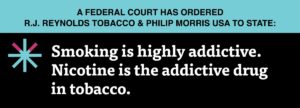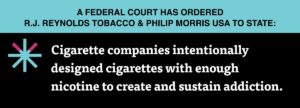It’s often a recurring New Year’s resolution for smokers: “This year, I’m going to quit!” We all know the many health benefits of quitting, but it’s hard! And the reason for that is because your body has become physically addicted to nicotine, the chemical found in tobacco. No, you don’t have an “addictive personality.” You have been enticed into consuming a highly addictive substance.
Experts recognize tobacco addiction as a chronic brain disease. Tobacco companies have known for decades that they were luring people into a harmful addiction, yet continued to do so through aggressive advertising. Even more damning, cigarette companies intentionally manipulated cigarettes to make them more addictive and deliberately misled the public about the dangers of smoking. As one company executive admitted: “Nicotine is addictive. We are, then, in the business of selling nicotine, an addictive drug.”
In addition to the health warnings on cigarette packages that cover cancer risks, birth defects, and lung disease, the government now requires warnings about addiction, such as those below, to be placed wherever cigarettes are sold. It seems, however, that it’s a matter of too little, too late for many.



While nicotine itself does not cause cancer, it’s the drug that keeps us consuming products like cigarettes that contain cancer-causing ingredients including arsenic, formaldehyde, benzene, and lead. It is the devastating long-term effects of these chemicals on our health that we are trying to minimize when we quit smoking.
Nicotine Changes Your Brain
Cigarette addiction is not your fault. The nature of addiction involves the relentless pursuit of a drug or behavior that produces a positive reward despite negative consequences. When you take a drag of a cigarette and inhale the smoke, nicotine travels to your lungs and moves quickly to your brain, often within seconds of when it’s inhaled.
Once it hits your brain, nicotine activates several different neurotransmitters, including those responsible for reducing tension and anxiety, appetite suppression, and others whose effects are often perceived as positive. It also triggers the release of endorphins and dopamine, the so-called “feel-good” hormones—nature’s reward system.
Unfortunately, as dopamine levels begin to decline again, we feel the “need” for another cigarette, and the cycle starts again. To make matters worse, as our tolerance for nicotine builds up over time, we need more and more to bring us the level of pleasure we seek. The chemical effects of nicotine in our brains are what keeps us going back for more, which is why it’s so hard to quit.
Add to that the comfort some smokers take in the ritual of smoking, the place it can hold in a daily routine, the camaraderie found with fellow smokers, and there are many reasons why it can be difficult to stop. Research suggests that nicotine is as addictive as heroin, cocaine, or alcohol.
What Tools Can Help Me Quit?
The American Lung Association (ALA) says that it takes a smoker six to eleven attempts before they are completely smoke-free, so if at first you don’t succeed, don’t be discouraged. Whether you decide to go “cold turkey” or take a more measured approach, there are many different tools you can use to help including:
- self-help resources
- counseling
- nicotine replacement therapies (NRT)
- nicotine gum
- nicotine inhaler
- nicotine lozenge
- nicotine nasal spray
- nicotine patch
- prescriptions medications
- varenicline (Chantix®)
- bupropion SR (Zyban®)
- a combination of counseling and medication
Research by the National Institute for Health (NIH) suggests that a combination of counseling and medication is the most effective approach for quitting smoking, nearly tripling your chance of success. By contrast, the ALA says that only 4 to 7 percent of people who try to quit “cold turkey are successful in staying tobacco-free.” While it might seem counterintuitive, nicotine replacement therapy, or NRT, has been found to be helpful by gradually reducing the level of nicotine in your system thereby reducing your cravings for cigarettes and, by extension, the toxic chemicals found in cigarettes. Additionally, the prescription medications listed above have been approved by the FDA. They are considered safe and effective at helping people quit smoking by helping relieve some of the withdrawal symptoms. We encourage you to reach out to your doctor to see what treatments might be best suited to your needs.
Online resources such as the ALA’s Freedom From Smoking Program or the American Cancer Society’s Empowered to Quit can be good places to start looking for information. Phone apps such as the National Cancer Institute’s SmokefreeTXT or the quitSTART app from smokefree.gov can also be helpful. Always remember that it’s a journey. A slip-up doesn’t mean failure but an opportunity to try again. Every day without tobacco is considered a win!
We wish you good luck on your journey away from tobacco.
Contact a Tobacco Litigation Attorney Today
If you or a loved one has developed lung cancer as a result of smoking in Massachusetts and can document your smoking history, we’d be happy to talk to you, free of charge, about the possibility of seeking financial compensation from Big Tobacco. We have secured life-changing verdicts or settlements for hundreds of individuals and their families, including those impacted by tobacco-related diseases.
Additional Resources:








